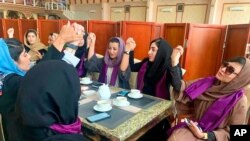The United Nations Women’s agency expressed its “profound” disappointment Wednesday at the lack of female participants in Afghanistan’s new Taliban transitional government.
“It is unacceptable that the international community would accept that women are not part of the government,” U.N. Women’s deputy representative for Afghanistan, Alison Davidian, told reporters via a video call from Kabul. “Not just for Afghanistan, but for any country.”
In announcing a new acting government on Tuesday, the Taliban — known for their severe repression of women’s rights during their previous tenure in the 1990s and early 2000s — presented a slate of male-only ministers. The Ministry of Women's Affairs was also missing from the list.
“Respect for women’s rights is a litmus test for any governing authority and against which any governing authority must be judged,” Davidian said. “But with the announcement yesterday, the Taliban missed a critical opportunity to show the world that it is truly committed to building an inclusive and prosperous society.”
U.N. Women has been working in the country for more than a decade, and its presence in Afghanistan is one of its largest, with some 75 national and international staff across the capital and five provincial offices.
But the road to more freedoms has been a slow one, with women still overwhelmingly illiterate and underrepresented in the workforce. The 2004 constitution enshrined gender equality as a principle, and women who have enjoyed nearly two decades of progress do not want to see that disappear. There has also been progress to establish laws making violence against women illegal.
Fighting back
Davidian said their extensive network of female civil society, human rights defenders and leaders has reported worrying rights rollbacks, such as women not being allowed to go to work or run errands without a male relative escorting them.
For the past week, women have been taking to the streets demanding their rights.
“We are seeing through the protests that Afghan women will not give up their rights; they will not be erased,” Davidian said.
She urged the international community to fund women-led civil society organizations to protect gains.
“This is the engine for progress. These are the drivers for progress and accountability,” she said.




